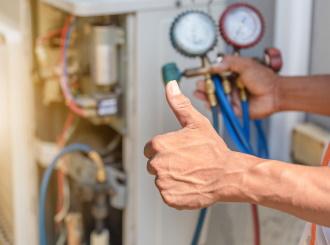New Heating Replacement in St. Louis Offers Money-Saving Opportunities
When selecting a new furnace, both the cost of installation and the cost of use are key considerations. Thanks to tax incentives and improvements in technology, an energy efficient furnace can be budget friendly as well as environmentally conscious. Meyer Heating and Air offers a variety of heating replacement options that come with their own local tax incentives.
The Nonbusiness Energy Property Credit
Created by the Energy Policy Act of 2005, the Nonbusiness Energy Property Credit expired in 2017, but was retroactively extended through the Further Consolidated Appropriations Act. Energy efficient furnaces installed before January 1, 2021 can qualify for a tax credit equaling 10% of the cost of the appliance, up to $150. This credit has a lifetime limit of $500, and is only applicable for existing primary residences within the United States – not new construction. For married couples who live apart in separately owned primary residences, the limit applies to each spouse separately.
Qualifying furnaces must run on natural gas, oil, or propane, and have an Annualized Fuel Utilization Efficiency of at least 95%, meaning less than 5% of the fuel used by the furnace escapes out the exhaust pipe.
The Residential Energy Efficient Property Credit
When most homeowners think about integrating renewable energy into their home, they imagine rooftop solar panels or small wind turbines to provide electricity. Few know there is a renewable energy option that can replace their furnace and air conditioner. Geothermal heat pumps, also known as ground source or heat-coupled heat pumps, use refrigerant-filled tubes underground to draw up heat in the winter and ground heat in the summer. Though the initial cost of installation is higher, many homeowners recoup the upfront cost in energy savings within 10 years. This period can be shortened through the use of federal tax incentives.
The Residential Energy Efficient Property credit is available to homeowners who install renewable energy sources in their homes, which includes geothermal. The exact size of this credit depends on the cost of the system and the date it was placed in service. For heat pumps installed between December 31, 2016 and January 1, 2020, the tax credit was 30% of the cost of the appliance. If the heat pump is installed between December 31, 2019 and January 1, 2021, the credit is 26%. If installed between December 31, 2020 and January 1, 2022, the credit is 22%. These dates and percentages apply to any other newly-installed renewable energy systems. Unlike the Nonbusiness Energy Property Credit, there is no limit (with the exception of fuel cells, which are limited to $500 per half kilowatt). Also unlike the Nonbusiness Energy Property Credit, this credit can be used for new construction, not solely for retrofitting existing structures.
Ameren Rebates
Ameren Corporation offers rebates to their customers in the St. Louis area who choose to make energy efficient upgrades to their heating and air systems. To qualify for one of these rebates, the system must be installed by a participating contractor, like Meyer Heating and Air. As with the Nonbusiness Energy Property Credit, these rebates are not available to new construction – only when replacing existing systems. Unlike the Residential Energy Efficient Property Credit, two types of heat pumps qualify.
A new geothermal heat pump qualifies for the largest rebate at $1,800 per unit. To qualify, the new heat pump must have an EER of 23 or greater. EER stands for Energy Efficiency Ratio, which is a rating created by the Air-Conditioning and Refrigeration Institute to measure the system’s efficiency at a single temperature under laboratory conditions. In addition to a sufficiently high rating, the new heat pump must be replacing an electric furnace in a single-family home.
The second type of qualifying heat pump is known as an air source heat pump. Like geothermal heat pumps, these use refrigerant-filled tubes to move heat in and out of a house, except these use the outside air instead of the earth to ground the heat. Ameren offers several different rebates depending on the efficiency of the pump and where it is installed. For air source heat pumps, Ameren uses SEER (Seasonal Energy Efficiency Ratio) ratings, which differ from EER ratings in that they measure the system’s efficiency at multiple temperatures under laboratory conditions. A new air source heat pump with a SEER rating of 18 or greater that replaces a central air & electric furnace will qualify for a $900 per unit rebate for a single family house or $500 per unit in a multifamily house. If the new air source heat pump has a SEER rating of 16 to 17.99, then it qualifies for a $750 per unit rebate for a single family house or $450 per unit in a multifamily house. If the SEER rating is 15, then the rebate drops to $600 per unit for a single family house and $400 per unit in a multifamily house.
Save Money on a New Furnace Replacement from Meyer Heating and Air
When it comes to heating and air near you, we’re your premier source for furnace repair and heating service in St. Louis. Whether you’re interested in an energy efficient gas furnace or a heat pump system, call Meyer Heating and Air at (314) 279-0933, or contact us online for more information. We’ll use our combined 30 years of experience to help you select the best heating replacement to meet your budget and energy efficiency needs.


